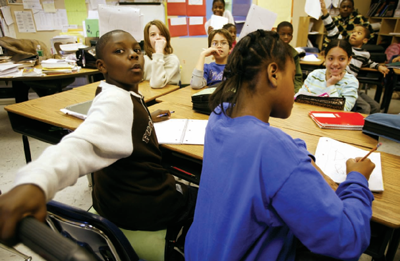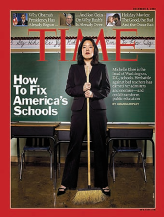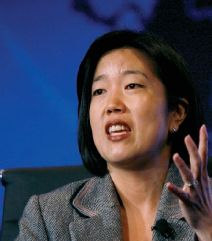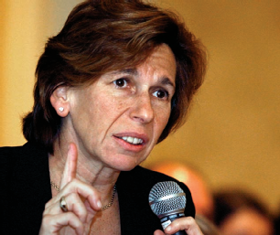Two Cornellians on opposite sides of the education debate—controversial former D.C. schools chancellor Michelle Rhee '92 and teachers' union leader Randi Weingarten '80—sat down with CAM to talk about school reform. (But not together.)
By Bill Sternberg
They are the two strong-willed women at the heart of the nation's debate on school reform. Both were featured in last year's education documentary Waiting for Superman—one as a hero, the other as a heavy. They have offices seven blocks from each other in Washington, D.C., but are miles apart philosophically. And, yes, reform advocate Michelle Rhee '92 and union leader Randi Weingarten '80 are both Cornellians, a connection they've never discussed. Rhee, forty-one, catapulted to national prominence—including appearances on Oprah and the covers of Time and Newsweek—as a result of her tumultuous three years as schools chancellor in the District of Columbia. Appointed in 2007 by Mayor Adrian Fenty to overhaul the troubled D.C. system, she fired hundreds of teachers and principals, closed schools, and reorganized the bureaucracy. Test scores rose and enrollment stabilized, but her steamroller style made enemies, not the least of them the Weingarten-led American Federation of Teachers. AFT poured money into the mayoral campaign of Vincent Gray, who defeated Fenty in last September's Democratic primary. Rhee, calling the outcome "devastating," resigned soon after. She has since started a new organization, Students First, to promote school reform. A native of Toledo and the divorced mother of two daughters, Rhee is engaged to former NBA star Kevin Johnson, the mayor of Sacramento.
Rhee, forty-one, catapulted to national prominence—including appearances on Oprah and the covers of Time and Newsweek—as a result of her tumultuous three years as schools chancellor in the District of Columbia. Appointed in 2007 by Mayor Adrian Fenty to overhaul the troubled D.C. system, she fired hundreds of teachers and principals, closed schools, and reorganized the bureaucracy. Test scores rose and enrollment stabilized, but her steamroller style made enemies, not the least of them the Weingarten-led American Federation of Teachers. AFT poured money into the mayoral campaign of Vincent Gray, who defeated Fenty in last September's Democratic primary. Rhee, calling the outcome "devastating," resigned soon after. She has since started a new organization, Students First, to promote school reform. A native of Toledo and the divorced mother of two daughters, Rhee is engaged to former NBA star Kevin Johnson, the mayor of Sacramento. Weingarten, fifty-three, is the nation's most powerful and highest-profile leader of unionized teachers. She was elected president of the 1.5-million member AFT after serving twelve years as leader of the New York City local, where she was known as a tenacious and combative negotiator. Since becoming AFT president in 2008, she has fought back against efforts to scapegoat teachers, but has embraced changes in the ways they are disciplined and evaluated. Raised in Rockland County, New York, Weingarten is a power broker in Democratic politics; her office overlooks the Capitol. The only openly gay union leader in the top ranks of organized labor, she lives in East Hampton, New York, and Washington, D.C.
In separate interviews ("If you can get them together, sell tickets!" says Richard Whitmire, author of The Bee Eater: Michelle Rhee Takes on the Nation's Worst School District), Rhee and Weingarten discussed education and each other.
Michelle Rhee: 'I'm Not Anti-Teacher'
Cornell Alumni Magazine: Your critics call you anti-teacher. Is that fair?Michelle Rhee: I'm not anti-teacher. I love great teachers. I think great teachers are the solution to the problems we face today in lots of ways. But the question at the end of the day is, where should the protection sit? Should the protection sit with the adults or with the kids?
CAM: In D.C., did you communicate well enough with the good teachers?
MR: It is true that I didn't have consistent communication with good teachers. But the other thing is, the media take the juiciest things. So when I said we're going to move a lot of ineffective teachers out, even though I said it within the context of a lot of other stuff, that's the sound bite. I get it. That's my inexperience in not having been in the political realm. So, lesson learned.
CAM: Did you try to do too much, too soon?
MR: No. When you are leading the worst school district in the country, which is what we were considered when I got here, and 8 percent of your kids are on grade level in mathematics, you can't move fast enough. If you talk to political people, they all say, "You moved too fast." But if you talk to parents and kids—the people we were actually serving—they all said, "I'm not going to wait for eight years for the school system to get better. I need it to get better today because my kid is only going to be a first grader one time."
CAM: Do you regret posing for the cover of Time dressed in black and holding a broom?
MR: No—and I wear black 90 percent of the time. It's my color.
CAM: Some people thought the image implied that the people you were dealing with were dirt.
MR: That one I haven't heard. If there's anyone in the city that would have told me we didn't need to clean house and we didn't need sweeping reforms, I would have said, "You're crazy."
CAM: Of all the things you did, what worked best?
MR: We put in place a new framework that laid out for teachers, principals, and administrators what we think good teaching and learning looks like. We put a new evaluation system in place. Then, finally, there was the new teachers' union contract that essentially got rid of tenure, seniority, and lock-step pay, which I think were the three albatrosses around our necks.
 CAM: What's the concept behind your new organization, Students First?
CAM: What's the concept behind your new organization, Students First?MR: Education reform can't be top down. It has to be the very people who are being screwed by the system every day saying, "We won't take this anymore, something's got to change" and demanding something different. The education policy in this country over the last thirty years has been driven by special interests. You have teachers' unions, testing companies, you name it. There is no organized interest group that's advocating on behalf of kids to bring balance. So that was the whole idea.
CAM: What, specifically, will the organization do?
MR: We want to become one of the most powerful membership organizations in the country. We are going to focus at the state and local levels because that's where laws, regulations, and union contracts can be changed. And we are going to do that the old-fashioned way—people and money. Our goal is to raise $1 billion and have a million members within the first year.
CAM: It sounds like you want to build a National Rifle Association for education reform.
MR: I don't love the NRA. Let's say an AARP. Part of what makes the teachers' unions so powerful is that they have members paying dues. That's what gives them the financial heft they need to have influence. Our model is similar.
CAM: What are the most important things to fix in K-12 education?
MR: Students First is going to focus on three areas. One is on human capital. Second is on providing choice to families. Third is around fiscal responsibility and accountability.
CAM: What do you mean by human capital?
MR: The human capital stuff is probably what I'm most well known for. Everything we did in D.C. over three years often got synthesized to "she fired people." We did a lot more than that, but that was one thing that hadn't happened before in urban school districts, certainly not in D.C.
CAM: Why so much focus on teacher accountability?
MR: If you look at all the data and research, it says the in-school factor that has the most impact is the quality of the teacher who is in front of the students every day. Even for kids who are living in the most disadvantaged situations, having three highly effective teachers in a row can literally change their life trajectory. We're not saying that the home and environment factors don't matter. But if this is the factor that's going to have the most impact, then that is where we must have the greatest focus.
CAM: How do you improve teacher quality?
MR: We need to recognize the best people, pay them more, and move away from a pay system based on seniority. It is also important to be able to quickly move out the lowest performers. If you can't improve, we're not going to throw you in jail. You might still be a really good person—but you can't have the privilege of teaching our kids. There's just too much at stake.
 CAM: Does Randi Weingarten of the AFT recognize the need for change?
CAM: Does Randi Weingarten of the AFT recognize the need for change? MR: I think she does. She's in a tough spot because, on the one hand, she's getting a tremendous amount of pressure from President Obama, [Education Secretary] Arne Duncan, and people like me. But on the flip side there is a portion of the rank and file who want to hold on to those protections. This is not about the teachers' unions needing to change. The unions are doing what they're supposed to—protecting the privileges, priorities, and pay of their members. They're doing an excellent job of that.
CAM: That suggests they care more about their privileges and priorities than they care about students.
MR: But they should. In the automotive industry, the unions are supposed to look out for their people. The purpose of the union isn't to build a cheaper, faster, better car. That's not their job.
'We have lost our competitive spirit. We want to make kids feel good about themselves, so we are always praising and coddling them when they don't always deserve it.'CAM: When you announced Students First, Weingarten said we need more cooperation and less conflict in education.
MR: What I would say back to that is that the harmony we have been trying to create for two decades, where all the adults get along, has not helped our kids. We know that. We have some fundamental differences in what we believe, and we need to bring those to light and duke it out a bit.
CAM: What message should people take away from the movie Waiting for Superman? MR: One, that teachers matter a ton. You saw great teachers, and some not so great teachers, in that movie. But what I think the movie was trying to tell you is that great teachers are a huge part of the solution.
CAM: What about the parents?
MR: One of the most maddening things that I hear a lot is that if inner-city parents cared more about their kids, we wouldn't have these problems. Nope. In the movie you could tell every single one of them wanted the best for their kids. They were all willing to do whatever it took to get their kid into a great school, even if it meant waking up at five in the morning.
CAM: Is there a larger social problem with the American style of parenting?
MR: I think in this country we have lost our competitive spirit. We want to make kids feel good about themselves, so we are always praising and coddling them when they don't always deserve it. My kids play soccer. They suck at soccer, but they have all these medals and ribbons and trophies because we don't want them to feel bad about themselves. I juxtapose it with Korea, which is at the top of the charts in all the academic stuff. In Korea, when you start in kindergarten you get a rank in your class, one to forty. You know where you are, and you know how far you have to go to be Number One.
CAM: When you were at Cornell twenty years ago, could you have envisioned yourself becoming the face of public education reform in America?
MR: Absolutely not. I never planned on going into education. When I was in my senior year I started hearing about Teach for America. A few weeks before I graduated, I was trying to figure out whether I was going to go to graduate school in industrial and labor relations or do Teach for America. I was weighing the two, and my grandmother said, "Go teach."
CAM: And the rest is history.
MR: And the rest is history.
Randi Weingarten: 'Teaching Is the Hardest Job on Earth'
Cornell Alumni Magazine: After Cornell and law school, you worked for a big Manhattan firm, but then you went to work in Brooklyn as a teacher.Randi Weingarten: That was the best job of my life. I loved my kids. I loved being a social studies teacher.
CAM: Teachers don't seem to be feeling much love these days. Why not?
'The newest silver bullet is: the teacher can do it all. Yes, we need to have well-prepared teachers. But if someone is hungry coming to school, or needs glasses and can't see a blackboard, we must deal with that as well.'RW: Our critics try to create a false choice between adults and kids. But all you have to do is spend 3.5 nanoseconds with teachers to know it is false. Teachers go into teaching because they want to make a difference in the lives of children. I'm not saying that all teachers are the same, or all teachers are good, but they go into teaching to make a difference.
CAM: Why do teachers need unions?
RW: To provide a voice for them and to get them the tools and conditions to do a good job.
CAM: What's behind what you've called the "relentless vilification" of unions?
RW: You have two things going on at the same time. First, fewer and fewer people are in unions, so there aren't the personal stories about how a union helped a mom or a dad or a grandpa or a grandma become part of the middle class or fight injustice. The second issue is that American workers are hurting. People are fearful. They wonder why others still have their rights, and they don't.
CAM: Can unions survive in this new environment?
RW: This is not simply a matter of surviving in this climate. My critics would love it to be that I am reacting to them. My frustration is that they have framed the agenda in such a negative way. The Michelle Rhees of the world want to shift all the responsibility for education onto the backs of individual teachers. Although I believe that teachers are really important, I don't believe they are the only or most essential ingredient in education.
CAM: Should teachers be evaluated based on how much their students improve on tests?
RW: This notion that you can evaluate teachers on one piece of data doesn't make sense, since teachers are not in control of all of the variables. At the same time, what my members and I were saying for years is that we shouldn't be responsible for any of it—and that's wrong, too. We should have an evaluation system that focuses on, "What have I taught, and what have kids learned?"
CAM: Can you endorse changes in discipline or evaluations without having backlash from the rank and file saying you're selling them out?
RW: In a big organization there are always going to be people who say you're a sellout. You have to spend time convincing people that what you are trying to do is good for people and teachers.
CAM: Can a good or great teacher, particularly in an inner-city area, overcome broken homes, street violence, and missing or indifferent parents?
RW: There's one study that says an individual teacher can trump all, and that study has a lot of holes and problems. Lots of studies say that teachers have a role in student achievement—but so do poverty and other variables in a student's life. I don't think this is an either/or situation.
CAM: Do the reformers expect too much from teachers?
 RW: The newest silver bullet is: the teacher can do it all. Yes, we need to have well-prepared teachers. But if someone is hungry coming to school, or needs glasses and can't see a blackboard, ultimately we must deal with that as well. You need a collaborative environment where we're all working together to ensure student achievement.
RW: The newest silver bullet is: the teacher can do it all. Yes, we need to have well-prepared teachers. But if someone is hungry coming to school, or needs glasses and can't see a blackboard, ultimately we must deal with that as well. You need a collaborative environment where we're all working together to ensure student achievement.CAM: You've been talking a fair amount about collaboration. But back when you were in New York City negotiating contracts with mayors, you weren't exactly known as Miss Congeniality.
RW: I've found over the course of twenty-five years that the better way to improve schools is through a collaborative, not a combative, approach. Now, sometimes you have to fight for your principles. But you have to constantly look for common ground.
CAM: Movie critics said you were cast as a villain or even a "foaming satanic beast" in Waiting for Superman. What did you think of the documentary?
RW: If you look at the box office results, people did not go see the movie. And when you talked to parents and teachers around the country, they wondered why it was so misleading. I understand why individual parents are trying to do the best for their kids, and they have every right to find the best circumstances for them. Every parent does. But what I wonder about that movie is why not one public school was featured—not one place where a union had worked with an employer to make a school great. So it was very misleading. It pulls at the heartstrings because of the kids. But balanced and fair, it is not.
CAM: Were you portrayed fairly?
RW: I speak in paragraphs, not sound bites— good, bad, or indifferent. So when my interviews in the movie were cut and used in a certain way, with eerie music, people can reach their own conclusions.
CAM: Were you sorry to see Fenty lose and Rhee resign?
RW: I think Vince Gray will be a great mayor. We were actively involved in the campaign. He won the primary decisively because people didn't like the way Fenty ran the city. There's a difference between believing in "my way or the highway" and being respectful. Michelle Rhee will say collaboration is overrated. I say that you have to convince people who are engaged in this work that what you're doing is important. It is about respecting others.
CAM: What do you make of her new organization, Students First?
RW: Ultimately you can't create a conflict situation that says you're either about the kids or the teachers. Teachers are about the kids, and the unions are about helping teachers help kids. So ultimately we have two different views of how you take a system from where we are now to a knowledge economy. And my view is that you do this through working together—taking what works, sustaining it, and scaling it up.
CAM: When Rhee announced Students First, you wished her well and urged cooperation. Have you gotten any response?
RW: No. Absolutely not.
CAM: One thing you hear from many teachers and parents is that a big part of the problem is unmotivated students. Is there a secret to motivating kids?
RW: Teaching is the hardest job on Earth. A classroom teacher is managing twenty to thirty youngsters in various stages of development. You have to be Mother Teresa, Martin Luther King, Albert Einstein, and Tony Soprano all wrapped up in one.
CAM: How do you feel about the Teach for America program as a route into education?
RW: Alternative certification routes have their place. Are they better than a good teacher's college? No. In terms of Teach for America, the participants don't feel very prepared and many of them leave teaching within a couple of years. And the reason that a lot of education types have been negative about it is because we think teaching shouldn't be a stepping stone to something else.
CAM: Why are Finland and so many other countries ahead of the U.S in the latest international study of student performance?
RW: They respect teachers. They create a national curriculum that people work on and make better. They prepare teachers, and they are very selective in who becomes a teacher. They give the teachers the tools they need. There's real respect.
CAM: Teachers' unions are under intense fire, and you have a very intense job. How long do you see yourself doing it?
RW: I don't have a personal timeline about the AFT, but my view is every single day there is an urgency to get something done. We have to help our schools help kids become ready for the knowledge economy and become productive citizens who understand and cherish our democracy. That's a big job, but teachers will lead the way.
Bill Sternberg '78 majored in American studies and was an editor of the Daily Sun. He is currently deputy editorial page editor at USA Today. He is co-author of Feeding Frenzy: The Inside Story of Wedtech, has written for the Atlantic and other publications, and is a member of the Cornell Alumni Magazine Committee.

Nice Blog. Thank you for sharing. Recently I found College Information which offers both Associate of Occupational Studies and Associate in Applied Science degree programs. The programs of study are listed below, Business, Health Disciplines, and Criminal Justice Computer Technology. You can also Visit.
ResponderExcluirhi. thanks for sharing such an inspiring blog. Do keep up sharing more updates.
ResponderExcluirEducation in USA